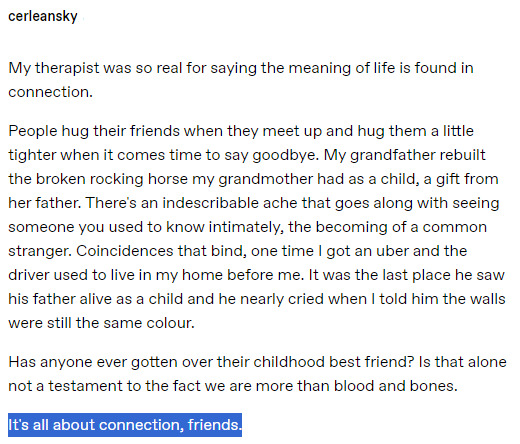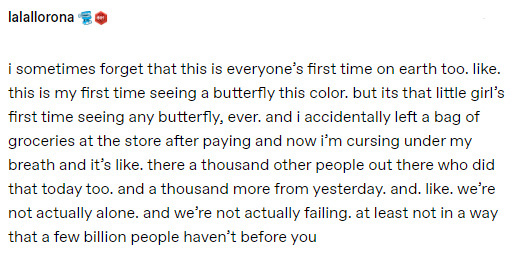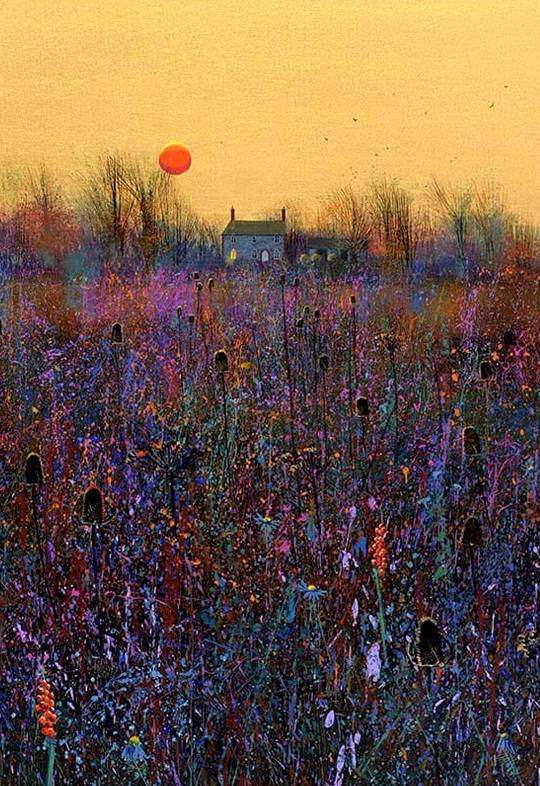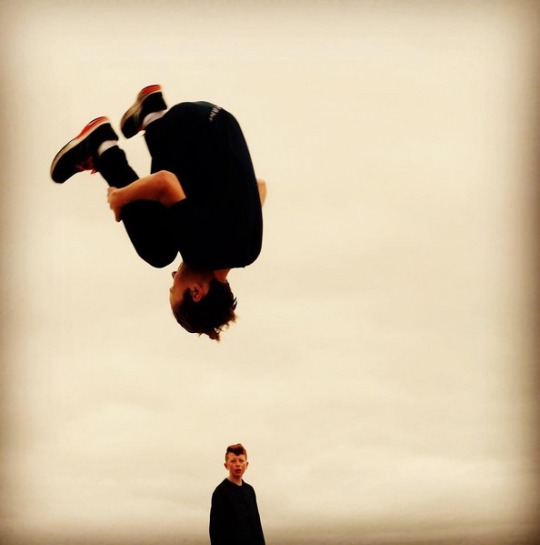#david abram
Text
The air is not a random bunch of gases simply drawn to earth by the earth's gravity, but an elixir generated by the soils, the oceans, and the numberless organisms that inhabit this world, each creature exchanging certain ingredients for others as it inhales and exhales, drinking the sunlight with our leaves or filtering the water with our gills, all of us contributing to the composition of this phantasmagoric brew, circulating it steadily between us and nourishing ourselves on its magic, generating ourselves from its substance. It is as endemic to the earth as the sandstone beneath my boots. Perhaps we should add the letter i to our planet's name, and call it "Eairth," in order to remind ourselves that the "air" is entirely a part of the earth, and the i, the I or self, is wholly immersed in that fluid element.
David Abram, Becoming Animal: An Earthly Cosmology
#quote#David Abram#Abram#ecology#nature#Earth#air#cosmology#environment#planet#landscape#philosophy#ecosystem
20 notes
·
View notes
Text




on human connection
@loveology2022 + @swordheld's tags \\ @cerleansky \\ david abram \\ @lalallorona
kofi
#on connection#on humanity#on relationships#on love#on humans#david abram#mine#my webweaving#webweaving#web weaving#webweave#web weave#web#webs#ww#parallel#parallels#parallelism#compilation#compilations#intertext#intertextuality#comparative#comparatives
2K notes
·
View notes
Text

by Paul Evans :: [ Thanks Paul Corby]
* * * *
Magic, then in its most primordial sense, is the experience of existing in a world made up of multiple intelligences, the intuition that every form that one perceives—from the swallow swooping overhead to the fly on a blade of grass, and indeed the blade of grass itself—is an experiencing form, an entity with its own predilections and sensations, albeit sensations that are different from our very own.
David Abram (via serpentandstang)
38 notes
·
View notes
Text
Our chest, rising and falling, knows that the strange verb “to be”
means more simply “to breathe”; it knows that the maples and the
birches are breathing, that the beaver pond inhales and exhales in
its own way, as do the stones and the mountains and the pipes
coursing water through the ground under the city. The lungs know
this secret as well as any can know it: that the inward and the
outward depths partake of the same mystery, that as the unseen
wind swirls within us, so it also whirls all around us, bending the
grasses and lofting the clouds even as it lights our own sensations.
The vocal cords, stirred by that breath, vibrate like spiderwebs or
telephone wires in the breeze, and the voice itself, laughing and
murmuring, joins its song to the water gurgling under the grate.
Only our words seem to forget, sometimes—or is it the one who
speaks and writes them who forgets? The contemporary person sits
enveloped in a cloud of winged words fluttering out of his mouth,
delighting in their colored patterns and the way they flock and
follow one another, becoming convinced that he alone is in blossom
—that his skull alone bears the pollen that will fertilize the barren
field, that the things stand mute and inert until he chooses to speak
of them. Yet the things have other plans. Bereft of our attentions, their migratory routes severed by the spreading clear-cuts and the dams, their tissues clogged by synthetic toxins leaking into the soils and the waters, they nevertheless carry on. The rising temperatures seem to scorch their surfaces ever more frequently now, yet the things of the world continue to beckon to us from behind the cloud of words, speaking instead with gestures and subtle rhythms, calling out to our animal bodies, tempting our skin with their varied textures and coaxing our muscles with their grace, inviting our thoughts to
remember and rejoin the wider community of intelligence.
David Abram - Becoming Animal: An Earthly Cosmology
27 notes
·
View notes
Text
The “real world” in which we find ourselves, then — the very world our sciences strive to fathom — is not a sheer “object,” not a fixed and finished “datum” from which all subjects and subjective qualities could be pared away, but is rather an intertwined matrix of sensations and perceptions, a collective field of experience lived through from many different angles. The mutual inscription of others in my experience, and (as I must assume) of myself in their experiences, effects the interweaving of our individual phenomenal fields into a single, ever-shifting fabric, a single phenomenal world or “reality.”
And yet, as we know from our everyday experience, the phenomenal world is remarkably stable and solid; we are able to count on it in so many ways, and we take for granted much of its structure and character. This experienced solidity is precisely sustained by the continual encounter with others, with other embodied subjects, other centers of experience. The encounter with other perceivers continually assures me that there is more to any thing, or to the world, than I myself can perceive at any moment. Besides that which I directly see of a particular oak tree or building, I know or intuit that there are also those facets of the oak or building that are visible to the other perceivers that I see. I sense that that tree is much more than what I directly see of it, since it is also what the others whom I see perceive of it; I sense that as a perceivable presence it already existed before I came to look at it, and indeed that it will not dissipate when I turn away from it, since it remains an experience for others — not just for other persons, but… for other sentient organisms, for the birds that nest in its branches and for the insects that move along its bark, and even, finally, for the sensitive cells and tissues of the oak itself, quietly drinking sunlight through its leaves. It is this informing of my perceptions by the evident perceptions and sensations of other bodily entities that establishes, for me, the relative solidity and stability of the world.
David Abram for The Marginalian. [emphasis added]
33 notes
·
View notes
Text
What is magic? In the deepest sense, magic is an experience. It’s the experience of finding oneself alive within a world that is itself alive … of contact and communication between oneself and something that is profoundly different from oneself …
David Abram
9 notes
·
View notes
Quote
There are so many unsung heroines and heroes at this broken moment in our collective story, so many courageous persons who, unbeknownst to themselves, are holding together the world by their resolute love or contagious joy. Although I do not know your names, I can feel you out there.
David Abram, Becoming Animal: An Earthly Cosmology (Vintage, August 24, 2010) (via Whiskey River)
67 notes
·
View notes
Text
My shipmate, @saranilssonbooks haggled me! I’m caught!
Book stack! Oh god. I am halfway through Melville’s the confidence man, (i might never finish that trip) Pierre (I’ve given up) Kierkegaards’ fear and trembling (god its so good but dude what the hell are you saying right now) David abrams the spell of the sensuous (its bonkers. It’s so good. Yes. I can’t wait to read it but also i have not touched it in a month) poison for breakfast by Lemony Snicket (never read snicket before but ohhhhh i will be doing more in the future. This is how philosophy should be. READABLE. This is one I’m actually reading because it’s so light and airy like a lemon meringue pie. Good) Nietzsche’s uhhh the antichrist (hate it. Shut the hell up you fucking emo pissed off skater boy. Find the beauty in life and touch some grass) Albert Camus’s THE PLAUGE (AAAAAAAAAAAAAAHHHHHHHHHHHHHHHHH RAHHHHH I WRITHE BENEATH HIS PROSE I SINK AND SLITHER, I CRY OUT NOISELESSLY INTO A WORLD WHICH KNOWS THAT GOODNESS MUST NOT BE PRAISED TO THE DETRIMENT OF MAKING US BELEIVE THAT EVIL IS A NATURAL PART OF MAN) yeah and ummm i just started interview with a vampire by Anne rice. ( ͡° ͜ʖ ͡°) gorl is horny. I thought i could listen to that glass of rat blood while at work. I was wrong. I got so worked up and was so startled when my boss inturrupted me. I’ll be finishing this within the next week. Hehe sexy evil vampires >:)
Last song: impressions by wild painting. Mmmmmmmm yes
Last film: across the spider verse! I watched it with a complete spider person nerd who paused it every five seconds and told us about the cameos. Good stuff.
Last show: avatar the last air bender live action. Costumes? YES sets? UAAAAH SO GOOD storyline? A FRESH DIFFERENT SIDE OF THE OG! COOL! Acting? …uh. Well. At least they’re not white and everyone’s names are pronounced correctly.
Current obsession: “my boyfriend” i am going to assume is not a valid answer here so i will go with phenomenology (the philosophical discipline) as a whole. My love, the oar with which I strike through the waves of life.
With my harpoon i strike @spaceacebreakface because i dont know anyone else :)
#Melville#books#college#David Abram#Kierkegaard#philosophy#phenomenology#Camus#the plague by Camus#Albert Camus#Anne rice#interview with the vampire#Lemony Snicket#poison for breakfast#nietzsche#yeah I’m tagging you bitch
4 notes
·
View notes
Text

Sitting on a gym ball, bouncing in my studio. The door pulses in relation to my movement.
#listening#body#listening experience#embodied listening#david abram#the spell of the sensuous#phenomenology
3 notes
·
View notes
Text
"As technological civilization diminishes the biotic diversity of the earth, language itself is diminished. As there are fewer and fewer songbirds in the air, due to the destruction of their forests and wetlands, human speech loses more and more of its evocative power. For when we no longer hear the voices of warbler and wren, our own speaking can no longer be nourished by their cadences. As the splashing speech of the rivers is silenced by more and more dams, as we drive more and more of the land’s wild voices into the oblivion of extinction, our own languages become increasingly impoverished and weightless, progressively emptied of their earthly resonance." — David Abram, The Spell of the Sensuous: Perception and Language in a More-Than-Human World
2 notes
·
View notes
Text
David Abram - long quote
". . . the underlying animistic cultures of Indonesia, like those of many islands in the Pacific, are steeped as well in beliefs often referred to by ethnologists as “ancestor worship,” and some may argue that the ritual reverence paid to one’s long-dead human ancestors (and the assumption of their influence in present life), easily invalidates my assertion that the various “powers” or “spirits” that move through the discourse of indigenous, oral peoples are ultimately tied to nonhuman (but nonetheless sentient) forces in the enveloping landscape. This objection rests upon certain assumptions implicit in Christian civilization, such as the assumption that the “spirits” of dead persons necessarily retain their human form, and that they reside in a domain outside of the physical world to which our senses give us access. However, most indigenous tribal peoples have no such ready recourse to an immaterial realm outside earthly nature. Our strictly human heavens and hells have only recently been abstracted from the sensuous world that surrounds us, from this more-than-human realm that abounds in its own winged intelligences and cloven-hoofed powers. For almost all oral cultures, the enveloping and sensuous earth remains the dwelling place of both the living and the dead. The “body”—whether human or otherwise—is not yet a mechanical object in such cultures, but is a magical entity, the mind’s own sensuous aspect, and at death the body’s decomposition into soil, worms, and dust can only signify the gradual reintegration of one’s ancestors and elders into the living landscape, from which all, too, are born. Each indigenous culture elaborates this recognition of metamorphosis in its own fashion, taking its clues from the particular terrain in which it is situated. Often the invisible atmosphere that animates the visible world—the subtle presence that circulates both within us and between all things—retains within itself the spirit or breath of the dead person until the time when that breath will enter and animate another visible body—a bird, or a deer, or a field of wild grain. Some cultures may burn, or “cremate,” the body in order to more completely return the person, as smoke, to the swirling air, while that which departs as flame is offered to the sun and stars, and that which lingers as ash is fed to the dense earth. Still other cultures may dismember the body, leaving certain parts in precise locations where they will likely be found by condors, or where they will be consumed by mountain lions or by wolves, thus hastening the re-incarnation of that person into a particular animal realm within the landscape. Such examples illustrate simply that death, in tribal cultures, initiates a metamorphosis wherein the person’s presence does not “vanish” from the sensible world (where would it go?) but rather remains as an animating force within the vastness of the landscape, whether subtly, in the wind, or more visibly, in animal form, or even as the eruptive, ever to be appeased, wrath of the volcano. “Ancestor worship,” in its myriad forms, then, is ultimately another mode of attentiveness to nonhuman nature; it signifies not so much an awe or reverence of human powers, but rather a reverence for those forms that awareness takes when it is not in human form, when the familiar human embodiment dies and decays to become part of the encompassing cosmos. This cycling of the human back into the larger world ensures that the other forms of experience that we encounter—whether ants, or willow trees, or clouds—are never absolutely alien to ourselves. Despite the obvious differences in shape, and ability, and style of being, they remain at least distantly familiar, even familial. It is, paradoxically, this perceived kinship or consanguinity that renders the difference, or otherness, so eerily potent."
― David Abram, The Spell of the Sensuous: Perception and Language in a More-Than-Human World
3 notes
·
View notes
Text
Only by welcoming uncertainty from the get-go can we acclimate ourselves to the shattering wonder that enfolds us. This animal body, for all its susceptibility and vertigo, remains the primary instrument of all our knowing, as the capricious earth remains our primary cosmos.
David Abram, Becoming Animal: An Earthly Cosmology
#quote#David Abram#Abram#Becoming Animal#cosmology#ecology#body#human body#knowledge#philosophy#embodiment#environment#senses#nature#Earth
153 notes
·
View notes
Text
This directly experienced terrain, rippling with cricket rhythms and scoured by the tides, is the very realm now most ravaged by the spreading consequences of our disregard […] Yet few [of these ravages] are as deep-rooted and damaging as the habitual tendency to view the sensuous earth as a subordinate space—whether as a sinful plane, riddled with temptation, needing to be transcended and left behind; or a menacing region needing to be beaten and bent to our will; or simply a vaguely disturbing dimension to be avoided, superseded, and explained away.
Corporeal life is indeed difficult. To identify with the sheer physicality of one’s flesh may well seem lunatic. The body is an imperfect and breakable entity vulnerable to a thousand and one insults—to scars and the scorn of others, to disease, decay, and death. And the material world that our body inhabits is hardly a gentle place. The shuddering beauty of this biosphere is bristling with thorns […] Thus do we shelter ourselves from the harrowing vulnerability of bodied existence. But by the same gesture we also insulate ourselves from the deepest wellsprings of joy. We cut our lives off from the necessary nourishment of contact and interchange with other shapes of life […]
For too long we’ve closed ourselves to the participatory life of our senses, inured ourselves to the felt intelligence of our muscled flesh and its manifold solidarities […] Only by welcoming uncertainty from the get-go can we acclimate ourselves to the shattering wonder that enfolds us. This animal body, for all its susceptibility and vertigo, remains the primary instrument of all our knowing, as the capricious earth remains our primary cosmos.

From Becoming Animal: An Earthly Cosmology, published 2010; Dir. David Abram (My Review Here) (My Ko-Fi Here)
1 note
·
View note
Photo

“Magic… in its perhaps most primordial sense, is the experience of existing in a world made up of multiple intelligences, the intuition that every form one perceives — from the swallow swooping overhead to the fly on a blade of grass, and indeed the blade of grass itself — is an experiencing form, an entity with its own predilections and sensations, albeit sensations that are very different from our own.”
- David Abram
35 notes
·
View notes
Quote
The old affinity between gravity and desire remains evident, perhaps, when we say that we have fallen in love—as though we were off-balance and tumbling through air, as though it was the steady pull of the planet that somehow lay behind the eros we feel toward another person. In this sense, gravity—the mutual attraction between our body and the earth—is the deep source of that more conscious delirium that draws us toward the presence of another person. Like the felt magnetism between two lovers, or between a mother and her child, the powerful attraction between the body and the earth offers sustenance and physical replenishment when it is consummated in contact. Although we’ve lately come to associate gravity with heaviness, and so to think of it as having a strictly downward vector, nonetheless something rises up into us from the solid earth whenever we’re in contact with it.
We give ourselves precious little chance to taste this nourishment that springs up into us whenever we touch ground, and so it’s hardly surprising that we’ve forgotten the erotic nature of gravity, and the enlivening pleasure of earthly contact. We spend our days walking not on the earth but on fabricated slabs suspended above office floors and basements; at our desks we ride aloft on our chairs; at night we drift to sleep on the backs of beds neatly raised so we needn’t be too close to the ground. If we venture out of doors, it’s commonly not to wander on foot; instead, we entrust ourselves to the fiery alchemy of the automobile, whose fevered cylinders and whirling tires loft us speedily to our destination without our needing to touch down on the intervening terrain.
David Abram - Becoming Animal: An Earthly Cosmology
13 notes
·
View notes
